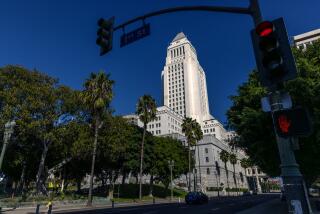Do the Public’s Business Out in the Open, Please
- Share via
In the long history of secret political deal-making, the June 19 closed-door meeting of four members of the City Council to smooth out the last few wrinkles of the city budget doesn’t amount to much. It can’t be shown that any decisions were made differently than they otherwise would have been had the little cabal not convened.
But government is supposed to be conducted in the open, and it is appalling that council members Gloria McColl, William Jones, Uvaldo Martinez and Ed Struiksma don’t understand that.
Disputes over conducting the public’s business in public frequently become Us vs. Them--struggles between public officials and the media. To look at this case that way would be a mistake. While the four council members were hashing out budget details in McColl’s office, dozens of people with an interest in the decisions they were making cooled their heels in the council chambers for more than an hour waiting for the scheduled meeting to begin. Thus, the council members not only flouted the spirit, and arguably the letter, of the state’s open meetings law, but also the rules of common courtesy.
It is appropriate for the news media--who cover government on a daily basis, and for profit--to fight these battles to keep the doors to the decision-making processes open, and this time the Tribune has filed a lawsuit seeking to restrain the council from again dodging the state’s Brown Act. But the kind of official deviousness these council members engaged in also frustrates people who do not have the resources or the knowledge to fight back. The open meetings law exists just as much to protect the rights of a single citizen with an interest in the budget’s smallest item as it does to protect the largest newspaper.
We support the Tribune in its lawsuit. Despite the fact a quorum of council members was not present at the secret meeting, half of the council members were. There can be little doubt that those who participated were trying to skirt the provisions of the Brown Act, whose charge to city councils is “that their actions be taken openly and that their deliberations be conducted openly. “
More to Read
Sign up for Essential California
The most important California stories and recommendations in your inbox every morning.
You may occasionally receive promotional content from the Los Angeles Times.










